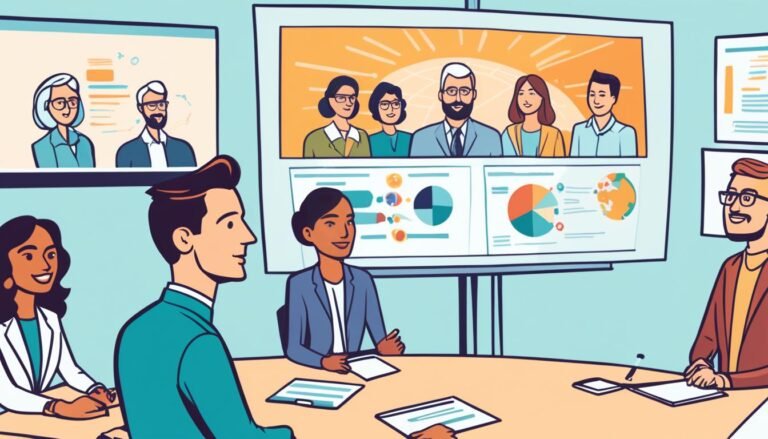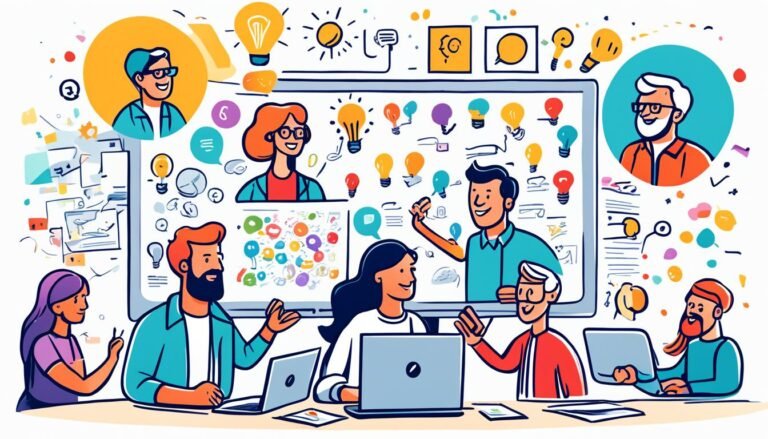L&D in Ireland: Unique Challenges and Opportunities
What makes Ireland a leader in learning and development, despite its challenges? The need for strategic training is growing. Ireland’s L&D scene shows both hurdles and chances. It’s about upskilling the workforce and keeping up with new trends in L&D.
Recent studies by NovoEd and GetWhys found a gap between what learning platforms can do and what they promise. Experts like Katie Sheketoff from Marriott International and Todd Moran from NovoEd shared their insights. They talked about real-world issues and the changing needs in L&D. With more online programs like Google’s global transformation, flexible learning platforms are key. For Ireland, using these tools is crucial to overcome L&D challenges and grab new chances.
Key Takeaways
- Understanding the gap between learning platform providers’ capabilities and promises is vital for effective L&D.
- Flexible learning platforms are critical for addressing the needs of the Irish workforce.
- Insights from industry leaders can guide strategic adaptations in L&D initiatives.
- Online programs like Google’s provide a model for successful leadership development.
- L&D data and analytics are indispensable for tracking progress and improving training outcomes.
The Current Landscape of L&D in Ireland
The world of Learning and Development (L&D) in Ireland is always changing. This change is driven by things like more hybrid work models and a big focus on mental health at work. Many companies are now taking steps to support Corporate Training Ireland.
Corporate Training Ireland: Existing Initiatives
Corporate Training Ireland has seen a big increase in training programs. These programs aim to improve employee skills and boost productivity. With more people working from home and in the office, companies are creating training that works for everyone.
This includes both online and in-person training. It’s important because 41% of Irish workers find it hard to keep good employees in a mix of home and office work.
Some common training programs are:
- Offering both virtual and in-person workshops on key business skills.
- Webinars, usually free or €75 for those not part of the group, on topics like AI in L&D and sustainability.
- The IITD National Conference and other big events that offer lots of learning chances.
Improving how employees do their jobs and making them more productive is a big goal in Ireland. This shows the need for training that fits these goals.
Government Policies and Support
The government in Ireland has been key in helping the L&D scene grow. It’s been supporting programs that help workers get new skills. This helps Ireland grow and prepares workers for what’s coming.
Some big ways the government helps include:
- Helping L&D Skillnet get training to companies at a lower cost.
- Encouraging businesses to invest in training their workers.
- Always checking that policies match what the market needs now and in the future.
These efforts help with talent development and boost the economy. The focus on health and safety and managing work performance shows how important government support is. It helps build a strong L&D system in Ireland.
Table of Key Initiatives and Policies:
| Initiative/Event | Cost for Members | Cost for Non-Members |
|---|---|---|
| IITD National Conference 2022 | Free | €75 |
| UFHRD Conference | €245 | €305 |
| “Leap Forward” at William Fry | Free | €75 |
| Webinars on AI in L&D | Free | €75 |
| Statistical Surveys on Global Sentiment | Free | €75 |
| Various Networking & Skill Events | Free | Free |
In conclusion, the work between Corporate Training Ireland and the government has made a strong and flexible learning environment. This environment is ready to face today’s and tomorrow’s challenges.
Industry-Specific L&D Needs in Ireland
In Ireland, different industries have their own learning and development (L&D) needs. These needs call for targeted and effective *Industry-Specific Training Ireland*. Each sector, like technology or manufacturing, needs training that fits their unique work and growth goals.
The history of L&D in Ireland is filled with important moments:
- The Industrial Revolution (1800-1914): This era brought a big need for skilled workers. Companies started offering training like apprenticeships and learning on the job.
- Post-World Wars Era (1945-1980): This time focused on how education and people’s skills drive economic growth. It led to the creation of professional groups and new ways of learning.
- The Information Age (1980-present): This era brought challenges like too much information and constant change. It made L&D strategies more focused on meeting company goals.
Now, technology is changing L&D in big ways. It includes AI, analytics, gamification, VR, AR, mobile learning, social media, and microlearning.
Today, having a plan for *Talent Development Strategies Ireland* is key. L&D needs differ a lot between sectors:
“NIIT’s Customer Experience Platform provides real-time learning dashboards for valuable insights into learner performance and program effectiveness.”
For sectors like manufacturing, where being precise and efficient is crucial, *Industry-Specific Training Ireland* is vital. VR and AR make learning more immersive, helping people learn and apply skills in real situations.
The tech sector also gains a lot from AI in learning. NIIT’s AI lab is testing over 150 AI uses in learning. This shows how AI can tailor training to fit both individual and company needs.
By 2024, 40% of companies plan to use generative AI in training. This change highlights the need for learning solutions that adapt to industry needs. Microlearning, which fits into work routines, also boosts engagement and makes learning more efficient.
| Era | Key L&D Focus |
|---|---|
| Industrial Revolution | Skilled Workforce, Apprenticeships |
| Post-World Wars Era | Education, Professional Associations |
| Information Age | Strategic L&D, Technology Integration |
In conclusion, using the right *Talent Development Strategies Ireland* and *Industry-Specific Training Ireland* helps companies do well in a fast-changing market. It meets the special needs of their industries in a smart and effective way.
The Unique Challenges and Opportunities of L&D in Ireland
Ireland’s L&D scene has its own set of challenges and chances. With tech changes and a varied workforce, there’s a big need for Irish Workforce Upskilling and Cross-Cultural Training Ireland. These efforts can boost how well organizations do and make them more inclusive.
Challenges of Upskilling the Irish Workforce
New tech demands new skills. The Deloitte University report shows only 28 percent feel ready for the changes. This highlights the need for Irish Workforce Upskilling. L&D experts must work closely with others to improve business performance.
The CIPD’s Learning At Work 2023 survey found less L&D alignment with company goals, from 77% to 67% over two years. This means L&D needs to better match business aims. It affects things like keeping staff, following rules, and being innovative. Creating a strong learning culture is key, but many struggle with talking to each other, which hurts inclusivity.
Opportunities in Cross-Cultural Training
Ireland’s growing diversity offers a big chance for Cross-Cultural Training Ireland. These programs help make workplaces more inclusive and effective. Making sure everyone feels important is vital for success. Also, linking L&D with business goals and focusing on ethics and security in tech adoption makes for a better learning plan.
Learning and Development Trends in Ireland
Organizations in Ireland are adapting to global standards by embracing new Learning and Development trends. These trends focus on digital learning and strategies for developing talent.
Digital Learning Transformation Ireland
The digital learning transformation in Ireland is changing how we train and develop. With 55% of adults lacking digital skills, there’s a big push for digital learning platforms. This change aims to fill skill gaps, offering personalized and flexible learning.
AI technologies are also playing a big role in this shift. Research shows that about one in six organizations use AI to improve learning and development. These technologies make learning more personalized, reduce workloads, and provide instant feedback for better learning outcomes.
- Focus on developing digital skills for the modern workforce.
- Using AI to offer learning tailored to each person.
- Adding on-demand, short learning sessions that fit into daily work.
| Country | Adults Engaged in Education or Training (2021) |
|---|---|
| Ireland | 14% |
| Sweden | 35% |
| Finland | 31% |
Talent Development Strategies Ireland
In Ireland, having effective talent development strategies is key, especially with only 23% of workers fully engaged. Companies are now focusing on attracting, keeping, and growing talent. Strong talent development programs are vital for improving engagement, keeping staff, and making them happy.
“93% of companies in Ireland worry about losing staff; but 75% of employees stay longer in companies that offer chances for moving up within the company.”
Companies should look at skills gaps, especially in leadership and management. This helps focus training efforts on boosting employee engagement and performance. Creating a learning environment that’s easy for everyone to use also helps all employees make the most of learning materials.
Future training in Ireland will focus on helping SMEs, being inclusive, and promoting environmental sustainability. By focusing on these areas, companies can build a culture of ongoing learning and improvement. This will help Ireland reach its goal of having 64.2% of adults in education or training by 2030.
The landscape of Learning and Development in Ireland is changing fast, thanks to digital advances and strategic talent development. Businesses that adapt to these trends will be well-positioned to succeed in a competitive world.
Future of Work and L&D in Ireland
The future of work in Ireland is changing fast, thanks to new tech and market changes. The LinkedIn Learning 2024 Workplace Learning Report found only 30% of people feel ready for the future with automation, digitization, and AI. This shows we all need to adapt quickly.
Setting career goals is key to getting more involved in learning, the report says. Those who set goals learn four times more than those who don’t. This shows how important setting goals is for keeping employees engaged and growing, making it a big part of the Future of Work Ireland.
Internal mobility is on the rise, showing how important it is to keep talent by offering them chances to move up within the company. Data shows that moving up within a company is crucial for career growth. Companies with strong learning cultures tend to have better skill development and bigger L&D teams. This fits with the idea that learning and development are key in the Future of Work Ireland.
Also, 4 out of 10 professionals see getting ready for the future of work as a top priority. In fields like IT, finance, consulting, and telecomms, getting ready for future challenges is a big worry. An insurance sector group predicts that in five years, 15% of jobs could be lost, and 50% might change because of technology.
This situation means Irish L&D experts need to use new tech like Learning Technologies Ireland to make workers more adaptable. Using these technologies is showing good results, especially in companies that focus on learning. These companies do better in skills development and learning activities.
Identifying key skills for the future is urgent for Irish companies to update their L&D plans. With the fastest growing skills among L&D pros pointing out key areas, Ireland needs to keep up. Taking proactive steps will help businesses build a workforce that can handle the changes coming in the Future of Work Ireland.
Here’s a snapshot of the recent findings from the survey:
| Metrics | Findings |
|---|---|
| Learner Engagement | 4x increase with career goals |
| Confidence in Future Skill Needs | 30% |
| Internal Mobility | Significant increase observed |
| Leadership Promotions | Higher percentage in firms with strong learning cultures |
Looking ahead, embracing Learning Technologies Ireland can help Irish organizations stay competitive. It can create a culture of ongoing growth and resilience.
The Role of Learning Technologies in L&D
In Ireland, the world of Learning and Development (L&D) is changing fast. Using new L&D tools is key to keeping skills sharp and boosting employee engagement. These tools are vital for organizations to know about.
Innovative Tools and Platforms
Top learning organizations in Ireland are putting more money into new L&D tools. A study found they spent more on tools and tech in 2019. Also, teams that add value to the business use many technologies to help learning.
- Automation Potential: A report by McKinsey says half of today’s work could be automated ten years earlier than thought.
- Minimalist Approaches: About 48% of L&D teams use just two or fewer simple tools, showing a need for more technology variety.
- Content Advocates: Around 36% of teams use three or more tools to make learning better.
Impact on Employee Engagement Initiatives Ireland
New L&D tools in Ireland help with employee engagement. For instance, using a wide range of tech supports learning beyond the classroom. This makes learning at work better.
Also, training programs like online courses and workshops help engage employees by linking their goals with the company’s aims. About 21% of HR managers see L&D as key for attracting and keeping top talent.
| L&D Team Classification | Percentage | Description |
|---|---|---|
| Minimalists | 48% | Use two or fewer simple tools |
| Content Advocates | 36% | Use three or more content and administrative tools |
| Broad-Range Users | 15% | Employ three or more non-content-related tools |
With ongoing tech advances, Ireland’s L&D sector is set to offer more interactive and efficient training. This will help organizations build a skilled and engaged workforce.
Academic Programs and Qualifications for L&D Professionals
In Ireland, the world of Learning and Development (L&D) is changing fast. Getting more education is key for L&D pros. Programs like the MSc in Strategic L&D Ireland and funding from L&D Skillnet help boost careers.
MSc in Strategic L&D
DCU Business School offers a top MSc in Strategic L&D Ireland. It’s a two-year program for part-time students. You’ll learn both theory and how to apply it in real situations.
Classes are online, lasting 3-4 hours each week on one evening. You’ll also have on-campus days twice a semester. To join, you need a 2:1 Honours degree in Business or a related field with work experience. Or, you can have a 2:1 Honours degree in any subject and 5 years of work experience.
Graduates get jobs like Change and Development Manager or Head of Leadership Development. The course’s highlight is the Strategic Consultancy Capstone Project. It lets students tackle real-world challenges.
Funding and L&D Skillnet
L&D Skillnet Funding helps make advanced education cheaper for professionals. It supports learning that helps with personal and industry growth. This means more qualified L&D experts for Ireland’s market.
In 2022, the UK saw 767,000 applications for full-time undergrad spots, with 560,000 getting in. This shows how much people value getting more education. For L&D careers, courses like the CIPD Level 7 Advanced Diploma and ITOL Diploma in L&D Management are great choices.
Conclusion
In Ireland, the world of L&D is complex but full of promise. Digital learning, talent development, and cross-cultural training are key to its future. Despite just 14% of adults in Ireland learning in 2021, the country is above the EU average at 11%. This shows a strong commitment to ongoing learning.
Government, companies, and schools all see the value in L&D. Programs like Enterprise Ireland’s Spotlight on Skills help employers find and fix skill gaps. With 89% of L&D experts believing in proactive skill-building, focusing on people in companies is crucial.
Dealing with L&D in Ireland means looking at many sides. We need to use new tech, work together with governments and companies, and support training programs. With jobs needing new skills fast—a 25% change since 2015—the push for ongoing learning is stronger than ever. By working together, Ireland can keep up with changes and have a skilled workforce for the future.
Source Links
- You Can’t Buy Your Way Out of This: The Role of Vendors in Solving L&D’s Biggest Strategic Problems – Webinars
- Utilizing L&D Data: How to Enhance HR with Learning Analytics [GUIDE]
- CIPD | People Profession 2023: UK and Ireland report
- Events details
- Learning & Development: Asset for Long Term Growth | ITD World
- Top 6 Learning and Development Trends for 2024 | NIIT
- Delivering Business Value Through Learning and Development
- The role of learning and development in 2024: back to basics
- Transforming the Irish Workplace with Learning and Development
- Learning and development trends 2024: What to expect
- 2024 Workplace Learning Report | LinkedIn Learning
- The Future of Work: DCU Business School research finds companies unprepared for technological change – DCU Business School
- CIPD | How L&D can create value: Leveraging technologies to organisational advantage
- The Role of Learning & Development in HR – HRHQ Ireland’s No1 Choice for HR News & Resources
- The Best L&D Qualifications in 2023 | Learning and Development
- MSc in Strategic Learning and Development – DCU Business School
- Skills Gap in Ireland: Urgent Need for Lifelong Learning and Upskilling – IMI








